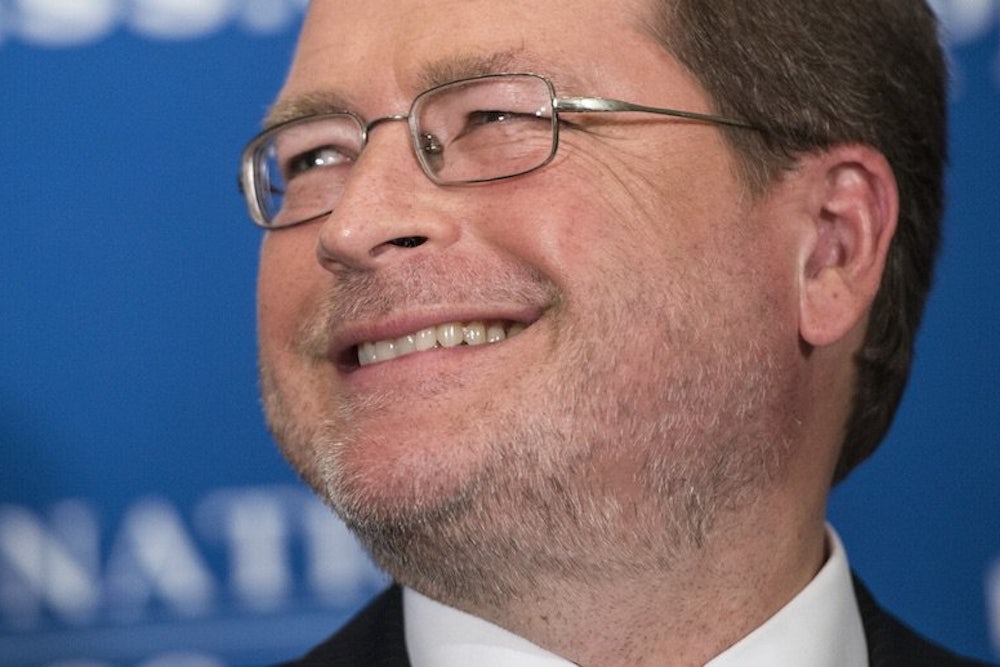From a zoomed in perspective, Republicans appear to be entering the 2016 election cycle in a terrible bind. As their presumptive candidates consider economic policy platforms, they're torn between two competing ideological camps: one, vast and imposing, prioritizes supply side tax cuts above all; another, less entrenched but more compelling, argues that Republicans should place tax relief for middle-income families at the top of the list.
Both ideas would entail significant budgetary costs, but their combined impact would be too severe to paper over with implausible scoring conventions or promised tax and spending offsets. It would force Republicans into the impossible position of squaring their Obama-era deficit hysteria with a renewed appreciation for fiscal profligacy, and thus, instead, touch off a big internal fight over which approach the party should adopt.
But any analysis of this apparent predicament that ignores the outsize influence of radical strategists in the conservative movement has missed the plot. The big danger for conservatives as they hopefully prepare to retake the White House isn’t that they’ve boxed themselves into a limiting posture of fiscal prudence. It’s that they will inherit a budget that's too rosy to make big strides toward the movement's goal of crushing safety net programs.
Barring an unexpected lurch away from Norquistism, the right’s biggest near-term objective in 2017—should a Republican win the presidency—will be to expand deficits dramatically. And that means tax cuts for everyone.
At New York Magazine, Jonathan Chait predicts the same outcome using a slightly underdetermined argument.
The resolution to this debate is very easy to forecast: The eventual Republican candidate will simply do both — cut taxes up and down the income ladder.The only reason Republicans can’t come out openly for a big, debt-financed tax cut right now is that they have invested heavily in an anti-deficit message during the Obama presidency. But the pattern of Republican politics since the 1970s is to inveigh against deficits during Democratic administrations, and then expand those deficits by cutting taxes when their own party regains power. As the deficit falls, Republicans have already begun de-emphasizing the deficit in their message. By the time a prospective Republican president takes office, it will be a dead issue for them.
Chait frames his argument around the question of whether the GOP is prepared to let George W. Bush’s younger brother lead the way toward a reprise of George W. Bush-era* policies.
It's an interesting inquiry, but it doesn’t really speak to why the party will effectively be in search of a vessel for profligate tax policy. That won’t be, as Chait implies, to resolve a debate within the movement, or because historical patterns dictate this outcome, but rather because the movement largely exists to create an economic and political environment conducive to massive retrenchment of the welfare state.
The phrase “starve the beast” summons up a false notion that deep, systemic, tax-side deficits will erode or eliminate expensive government programs automatically. They’ll actually create the kind of crisis environment Republicans know they'll need for deep safety net cuts to survive the political process. This line of strategic thinking shaped the debate within the GOP over the Bush tax cuts in the early 2000s. When the last remaining party moderates suggested that the Bush tax cuts should hew to their nominal purpose of stimulating the economy—and thus expire automatically should they produce enduring deficits—they learned that the real purpose was something else entirely. One of those moderates, senator Lincoln Chafee, took his case to then-majority leader Trent Lott, who read him into the program: "We're going to strangle the spending.”
Republicans used the second half of Obama’s first term to test this strategy. The Great Recession badly exacerbated the structural deficits George W. Bush created with deficit financed wars and tax cuts. At a trillion-plus dollars a year, the political pressure to consolidate the budget became severe. But Democrats and Republicans shared control of government, and in absence of a genuine fiscal crisis, Republicans lacked the natural leverage they needed to force Democratic hands. So they created it artificially. That summer, they used the threat of national default to mimic genuine national bankruptcy, and then refused to increase taxes. And it worked.
Republicans pocketed hundreds of billions of dollars in spending cuts essentially for free. Had Mitt Romney won the presidency in a similar budgetary environment, it would’ve been hard for them to justify a deficit financed tax cut—but they wouldn’t have needed to. They would have inherited precisely the budgetary environment they’d intended to create all along, and thus the political conditions required to challenge the New Deal consensus.
In 2017, the picture will very likely be inverted. Low deficits, rapid economic expansion, middling appetite for soak-the-poor fiscal policy—similar in many respects to the situation they faced in early 2001. But familiar challenges call for well-worn tactics. By reminding the public of the abysmal failure of the last presidency, nominating a Bush might make those tactics harder to execute. It would also be exquisitely appropriate.
(*That era did not end well for Republicans.)
